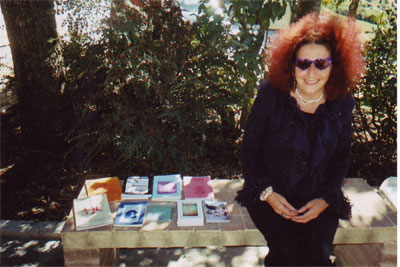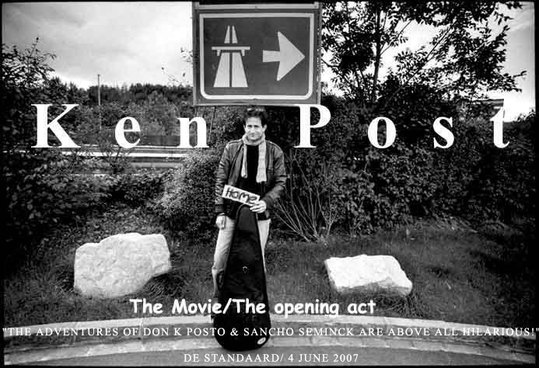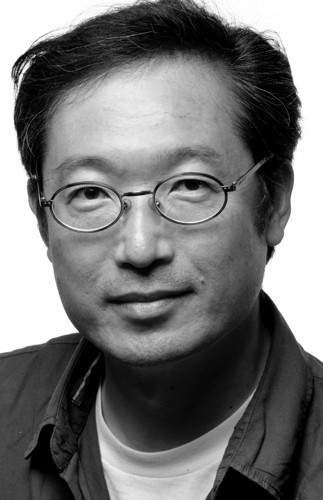Varkenshond is in 2007 ontstaan toen drie mannen met dezelfde levensbeschouwing elkaar ontmoetten op een symposium over kosmische stralen. Ze hebben zich vervolgens teruggetrokken in een verlaten klooster in Rusland en de resultaten van de daar, onder leiding van de zelfverklaarde "dokter" Karkaronga, uitgevoerde therapeutische muzikale bezinningssessies opgenomen voor hun eerste, titelloze, cd.
Vorig jaar hebben ze de wereld rondgereisd om dergelijke sessies te doen met stammen en communes wiens levensvisies, in de essentie, op dezelfde grondvesten zijn gebouwd als die van henzelf. Varkenshond is nu bezig met het verwerken van de opnames die daaruit zijn voortgekomen.
Varkenshond (Pig Dog) was created in 2007 when three men with the same philosophy of life met at a symposium on cosmic rays. They then retreated to an abandoned monastery in Russia and the results of that retreat, headed by the self-proclaimed "Doctor" Karkaronga, made for their first, untitled CD. These sessions were viewed upon by Varkenshond as a kind of therapeutic musical reflections.
Last year they traveled the world for such sessions to do with tribes and communes whose views of life are, in essence, built on the same foundations like their own. Pig Dog is busy these days processing the resulting recordings that have emerged during those sessions.
Ken has played the streets and squares since 1989. He recorded most of his work while being on the road. He started out by playing covers, but this gradually changed into playing his own compositions, while whirling around and jumping all over the squares of Europe.
He played throughout of Europe, but he has a preference for Antwerp in Belgium, Holland, Luzern in Swiss, and Dublin in Ireland.
He did not go unnoticed in the media as well because of his exuberant attitude, an attitude not much found in streetmusicians....
http://www.ken-post.com/start.html
PICK THAT LOCK
A GIFT FROM THE MOTHER
TO THE FIRST SON
TO REALIGN THE HEAVENS
EARTH, JUPITER & SATURN
TO RETURN EACH MISSING
MONTH, HOUR AND INCH
TO RETURN TO THE POOR
WHAT WAS STOLEN BY THE KINGS
I'M GONNA PICK THAT LOCK
I'M GONNA GET THROUGH THAT DOOR
I'M GONNA PICK THAT LOCK
I THINK I'VE BEEN
THROUGH IT BEFORE
I'M GONNA PICK THAT LOCK
I KNOW SOMEONE WHO'S BEEN
KNOCKING AT THAT DOOR
I GOT MY EARS TO THE STETHOSCOPE
LISTENING TO THE TUMBLERS
GOT MY EARS TO THE STETHOSCOPE
(CLICK) GOT THE FIRST NUMBER
IF I BREAK THE COMBINATION
THERE WILL BE A
CELEBRATION TONIGHT
I GOT MY EYES ON THE SKY
DON'T NEED NO TELESCOPE
I'VE SEEN PI IN THE SKY
DON'T NEED NO TELESCOPE
I'VE GOT A SPHINX IN SIGHT
IT'S ONLY A RIDDLE IN DAYLIGHT
GOT THE SPHINX IN MY SIGHTS
I'M GONNA BREAK THAT CODE
I'M GONNA BLOW THAT NOTE
I'M GONNA RIDE THAT WAVE
FEEL YOUR FEARS DISSIPATE
ANTICIPATE THE MOMENT
WHEN THE MATHEMATICIAN
LIES DOWN WITH THE POET
I'M GONNA WATCH YOU FLOAT
AS I HIT THAT NOTE
HIGHER THAN THE BIRDS
SURFING THE EARTH'S CURVE
DEFYING GRAVITY'S SWAY
OUT INTO SPACE
WHERE THE METEORS RACE BY
THERE'S A LOT AT STAKE
YOU'RE NOT HERE TO
SUFFER A FATE
IT'S THE PROCLAMATION DAYS
THE EMANCIPATION PHASE
HOLD YOUR HEAD UP STRAIGHT
DON'T HESITATE
YOUR DESTINY AWAITS
WE'RE NOT HERE BY CHANCE
NO ARBITRARY CONSTRUCTS
NO ACCIDENTAL CIRCUMSTANCE
NO HAPHAZARD PLANET WANDERING
NO SUPERFICIAL PREACHERS
POSTURING
THIS COULD BE HEAVEN
THIS COULD BE HELL
A RETURN TO THE GARDEN
OR A BURN'T UP SHELL
Yasuhiro Yotsumoto was born in Osaka, Japan in 1959 and grew up mostly in Hiroshima. His first book of poetry A Laughing Bug was published in 1991, followed by 8 more collections in Japan including Hijacking Logos (2010), Starboard of My Wife(2006), and Afternoon of Forbidden Words (2003), which won the prestigious Hagiwara Sakutaro Award. His poems have been translated into more than 15 languages, including 3 books published in Australia, Serbia, and Romania. Yasuhiro also writes essays, literary criticism, and translates poetry from English to Japanese. He is the editor of Poetry International Web – Japan http://japan.poetryinternational.org, and of a Japanese poetry magazine Beagle. MEETING IN THE SHADOW
It was either before I fell asleep
or just after I woke up that my wife said matter of factly
she had met my mother.
I only said “yes” but sure I knew
that my mother, dead for a quarter century,
would not travel all the way from her shore.
It must be my wife who set out,
walking across the field of dreams, climbing down the valley.
Her boldness, hidden under the apparent timidity, has not changed
at all since we first met – a quarter century ago.
She still jumps at the bang of a door,
yet is lured so easily by the sun and the wind, and
can dance without music.
But when the wind stops, it’s so deadly quiet here.
Over from the hilltop of a closed eyelid,
I see my wife walking back.
Her face smeared with dirt, her bare foot bleeding,
she holds to her chest silence which looks like a strange animal.
(-)
ik heb deze nacht uit klei
een Aziatisch meisje gekneed
en mijn oor te luisteren gelegd
bij een oude, wijze, glascontainer
hangend aan mijn opgeblazen onderlip
ben ik opgestegen om de maan zijn
mythe te doorprikken, ook heb ik met
al mijn vuur het liegende water geblust
en alle vogels vlogen zich die ochtend
te pletter omdat ze van mijn gedrochten
het kloppend hart niet begrepen
Dichter en performer Andy Fierens (1976) geldt als het buitenbeentje van de Vlaamse literaire wereld. Met zijn hilarische en genadeloze teksten, en met zijn compromisloze live performances, werd hij algauw een opmerkelijke en veelgevraagde gast op podia in België, Nederland en Zuid-Afrika. http://www.debezigebij.nl/web/Auteur/Andy-Fierens.htm
Dichters in de Nacht van de Filosofie: Tsjisse Hettema; Anne Feddema; Berber van der Geest; Willem Abma; Gerrit Komrij; Hans Plomp; Jelle Bangma en Jikke Ozinga.
Hans Plomp werd op die gedenkwaardige koude Tweede Wereldoorlogsdag van de 29stejanuari 1944 te Amsterdam geboren. In 1959, toen hij nog op de middelbare school zat, begon hij gedichten te schrijven. In die tijd bewoonde hij een zolderkamer, drie verdiepingen hoger gelegen dan de slaapkamer van zijn ouders. Op die kamer leidde hij enkele jaren zijn eigen leven, kwam en ging wanneer hij wilde, vooral als de volwassenen sliepen.
Helaas ontdekten zijn ouders dat hij 's nachts lang niet altijd in zijn bed lag te slapen en besloten hem kort te houden. Hij moest naar een kamertje naast hun slaapkamer verhuizen en werd constant in de gaten gehouden. In zijn 'isoleercel' kwam hij tot de ontdekking dat hij in het schemerdonker in elk geval nog wel iets kon doen: schrijven. Zo ontstond zijn eerste poëzie, 'woorden van woede en eenzaamheid'.
Spoedig trad Hans Plomp toe tot de schoolkrantredactie, waar Vera de Vries (Xaviera Hollander) zijn collega was. Hun eerste uitgave werd door de directie verboden. Ze vervaardigden toen ondergrondse geschriftjes, die onder de leerlingen verspreid werden. De redactie organiseerde ook een literaire avond, waarvoor ze Gerard Reve uitnodigden. Hans Plomp overhandigde hem enkele van zijn 'haatverhalen'. Gerard Reve bleek het gruwelijkste verhaal het meest te waarderen. Plomp merkte dat Reve in zijn karakter alles prees wat zijn ouders verfoeide. Het werd voor hem duidelijk dat hij schrijver moest worden om een uitingsvorm en misschien zelfs waardering te vinden voor zijn rebellerende persoonlijkheid. In 1962 reisde Hans Plomp met Gerard Reve mee om een congres van schoolkrantredacties bij te wonen.
Na zijn middelbare school ging Plomp Nederlands studeren en werkte daarna enige tijd als leraar. Plomp werd actief in Provo, gaf zijn leraarschap op en publiceerde in 1968 zijn eerste roman. Zijn debuut en de erop volgende boeken sloegen in als een bom. In enkele latere boeken beschrijft hij de 'scene' van binnenuit. Vooral het Amsterdams Dodenboekje wordt beroemd.
In 1973 bezet hij met vrienden en vriendinnen het dorp Ruigoord, dat gesloopt dreigde te worden (in 2001 werd pas duidelijk dat Ruigoord kon blijven bestaan, ingeklemd tussen nieuwe havenbedrijven). Het wordt het hoofdkwartier van het Amsterdams Ballon Gezelschap (A.B.G.), een anarchistisch/creatief verbond van vrije geesten. In Ruigoord ontstaat een experimentele leefgemeenschap zonder autoriteiten of politie, die na dertig jaar bloeit als nooit tevoren.
Met het A.B.G. organiseert Plomp festivals en manifestaties in binnen- en buitenland. Hij publiceerde intussen een dertigtal boeken en is een enthousiast reiziger, zowel in de geest als op de planeet Aarde. Werken van Hans PlompDe ondertrouw (1968)De chinese kruiwagen (1969)Het Amsterdamse dodenboekje (1970)Manifest voor de jaren zeventig (1970)Huize de Slapeloze nachten (1971)Moker in Mokum (1971)Brigadier Snuf rookt stuff (1972)Gekkenwerk (1972)Satan ontmaskerd (1973)Op zoek (1975)In de buik van moeder Natuur (1976)Lofzang op de moraal (1976)Venus in Holland; gedichten 1960-1981 (1981)Gedroomde reizen met vrouwen (1982)Een schizofreen is nooit alleen (1983)Open inrichting (1985)Lokomotive (1986)Gulle nachtmoeder (1987)Revolvers lijkt me overdreven (1987)Het innerlijk bordeel (1990)In India (1991)Uit je bol (1994)Het beest is los! (1995)Jaya en het orakel (1995)Jozefien van het Kietelbos (2000) Hans Plomp was born in Amsterdam in 1944. After his studies he became a teacher, but he gave up regular jobs for good when his first novel De Ondertrouw (The Banns Are Up) was successful. He took an active part in the playful Dutch Provo Revolution of the Sixties, which made Amsterdam one of the hippest places on the planet. After Provo, he helped found Culturele Vrijhaven Ruigoord, the Amsterdam Balloon Company, and the Fiery Tongues Poetry Festival, and he traveled extensively, especially in India, where he spent some five years. In 1982, he toured with U.S. with a group of prominent Dutch poets, performing with Ann Waldman, Diane di Prima, Allen Ginsberg, Gregory Corso, Amiri Baraka, Ira Cohen and many other kindred spirits. He has published novels, short stories, poetry, and essays that have been translated into many languages, including Danish, English, French, German, Polish, and Spanish. Last year, Ekstasis Editions, in Victoria, British Columbia, published Tantric Picnic: Tales of India, the first English-language collection of his India stories. A few of the poems that appear in this edition of Big Bridgewere first published in City Lights Pocket Poets Series #42: Nine Dutch Poets.
The Joyous Cosmology are an intense freak-out collective from Antwerp. They take improvisation to its most extreme form, aiming for total freedom, fresh poetic associations and cosmic insights. With drums, synths, guitar, sax and a wide range of other instruments these joyous voyagers guide the listener to new dimensions of total synesthesia.
Philip Meersman (°1971, Belgium). Philip created and executed poetry-performances in Belgium, Holland, Italy, rance, Austria, Bulgaria, Macedonia, Romania, Israel and in November 2008 in Argentinia. His poetry has been translated into French, English, Bulgarian, Macedonian, Russian, Spanish, Romanian, Italian, Hebrew and Arabic and has been published in several literary magazines, anthologies and art or poetry festival publications. He’s a founding member of the (international) artist collectives DAstrugistenDA and artiestencollectief JA!. His work puts the emphasis on playing with the sounds which become a language, on deconstructing language to it’s basic sounds. Sounds and images are also (and even more so than language a convention) universal forms of communication. Stretching conventions, bend them and breaking them so different word meanings and word forms become the centre of his poetry in relation to current affairs. CHECK THE ENGLISH VIDEO JUST BELOW
 click on image for a visit International poet, classical sarangi musician, scholar, and translator of Rene Daumal and Henri Michaux, Louise Landes Levi has traveled the globe for three decades. Her poetry books include, Banana Baby (Supernova, 2006), Avenue A & 9th Street (Shivastan, 2004), Chorma (Porto dei Santi, 2000) Guru Punk, (Cool Grove Press, 1999), Sweet on my Lips, Love poems of Mira Bai (Cool Grove Press, 1997), The House Lamps Have Been Lit(Supernova, 1996), Extinctions, (Left Hand Books, 1993), and Concerto, (City Lights, Accordian Series, 1988). Rene Daumal’s Rasa was published by New Directions in 1982 and most recently, Toward Totality (Vers La Completude) & Selected Works 1929-1973 of Henri Michaux (Shivastan, 2006) and Toward Totality I / Vers La Completude (Longhouse, 2006). Reviews, essays and poems have been published online in Big Bridge, Jacket, and Rain Taxi, among other publications.
The angels & messengers were not found in areas of
conventional well-being. Their visits were unannounced, their speach unique, their teaching direct. Breath
does not distort, nor song, nor poetic genius. This world's transitory nature is also the
domain of bliss.
|



